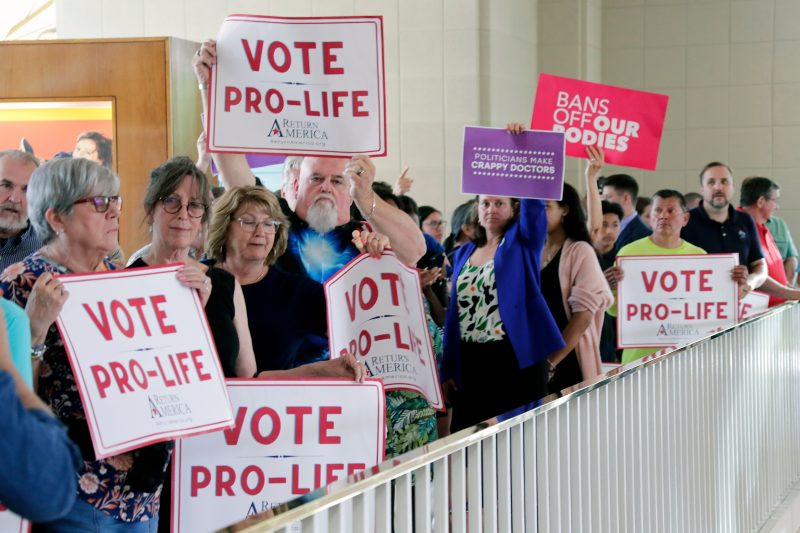Lawmakers in two Republican-led states are poised to restrict abortion after 12 weeks of pregnancy, with the North Carolina Senate voting 30 to 20 Tuesday afternoon to override the veto of Gov. Roy Cooper (D), while legislators in Nebraska prepare to weigh in on a similar measure.
The North Carolina House would also need to vote to override Cooper’s veto before the 12-week ban becomes law; that chamber is expected to consider the legislation Tuesday evening.
The bills would both significantly narrow the window for legal abortions but stop short of more restrictive bans that have taken effect across the South and Midwest since the Supreme Court overturned Roe v. Wade — the result of a push from moderate Republicans who feared political backlash.
In South Carolina, Republicans are moving a bill through the state legislature that would ban most abortions once fetal cardiac activity is detected, which is around the sixth week of pregnancy. The Republican governor ordered lawmakers back into session to complete unfinished work, including on legislation restricting abortions. A near-total ban in the state recently failed.
The dynamics underscore the resistance GOP lawmakers are facing over restrictions even within their own party, as Republican hard-liners reluctantly move toward legislation many see as a compromise, after failing to muster enough support for stricter measures.
Until recently, North Carolina’s legislature had no hope of passing any kind of abortion ban, subject to Cooper’s veto pen. But the dynamic shifted in April, when Republicans gained the votes necessary to override his veto after a former Democrat, Rep. Tricia Cotham, switched to the Republican Party.
When the 12-week ban initially passed in early May with Cotham’s support, Cooper launched an aggressive effort to prevent a veto override, targeting a handful of moderate Republicans, including Cotham, who pledged during their campaigns to oppose further restrictions on abortion.
“If just one Republican in either the House or the Senate keeps a campaign promise to protect women’s reproductive health, we can stop this ban,” Cooper said at a rally before he vetoed the bill on Saturday, surrounded by a crowd of abortion rights supporters.
Republicans in the legislature say they hope the 12-week ban will become a model for the rest of the country, portraying the bill as a “mainstream” alternative to abortion bans that outlaw abortion earlier in pregnancy. It is the first new abortion ban to pass since the fall of Roe v. Wade that does not outlaw all or most abortions, effectively allowing roughly 90 percent of abortions to continue.
The Senate debated the bill for roughly an hour, with Democrats criticizing the proposed restrictions on abortion and Republicans defending the measure.
“I think this is really in line with what the majority of North Carolinians believe and so I’m not particularly concerned about the backlash,” North Carolina state Sen. Amy Galey (R) said in an interview. “It’s a reasonable bill for this time.”
Republicans have staunchly rejected the characterization of the bill as a “ban,” repeatedly interrupting Democrats on the Senate floor who used the term and asking them to rephrase.
“A ban is when you can’t do something,” Galey said. “‘Ban’ is a really harsh word.”
Democrats insisted the restrictions would have a broader impact on care for pregnant women, arguing patients have been denied lifesaving care in states where abortions have been banned.
“You as lawmakers are betraying your constituents and knowingly putting North Carolinians in danger,” state Sen. Gladys A. Robinson (D) said on the Senate floor Tuesday. “This monster abortion ban will lead to substandard care.”
North Carolina Democrats have argued fiercely that the legislation would halt abortions long before the 12-week mark, expressing particular concern about a provision that would require patients to have an in-person consultation with a doctor at least 72 hours before an abortion, in addition to the visit required for the abortion itself.
The extra in-person visit would make it harder for out-of-state patients to travel to North Carolina, which currently allows abortion until 20 weeks of pregnancy and has become a destination for patients seeking abortions across the South in the wake of the Supreme Court ruling. In the first two months after the landmark decision, North Carolina experienced a greater spike in abortions than any other state.
Cooper flatly rejected the depiction of the 12-week ban as “mainstream.”
“This is an abortion ban that dramatically reduces women’s health-care freedom,” Cooper said in an interview. “They’re trying to dress this up as a reasonable 12-week ban. It’s not.”
The new legislation would establish exceptions for rape and incest through 20 weeks, along with an exception for lethal fetal anomalies through 24 weeks and a general exception for the life of the mother. Unlike many other abortion restrictions, the ban is coupled with tens of millions of dollars in funding for child care, foster care and paid family leave — money that GOP lawmakers said was added to address criticisms from abortion rights advocates that conservatives often seek to ban abortions but fail to support mothers and babies.
The passage of the 12-week abortion ban in North Carolina earlier this month was the culmination of months of highly secretive meetings in the Republican caucus where lawmakers struggled to agree on an abortion ban that could win enough votes to override a veto.
Rather than introducing the proposal as a new bill, as is typical, Republicans instead gutted a different piece of legislation and inserted the 46-page abortion bill, allowing them to circumvent the usual committee process, which can take weeks or months — a move Democrats called fitting for an autocracy.
“I just don’t believe this is how democracy should work,” House Minority Leader Robert Reives (D) said in a hearing earlier this month. “This affects the rights of one-half of the population of this state.”
Conversations about a potential abortion ban began in Raleigh, the state capital, soon after the Supreme Court ruling, according to several people familiar with the events who spoke on the condition of anonymity to discuss private conversations. While a plurality of Republicans supported a stricter ban that would outlaw abortion after six weeks of pregnancy, the people said, several moderate Republicans stood their ground and refused to go beyond 12 weeks, keenly aware of the political backlash to strict abortion bans that has been mounting since the decision.
In the months since Roe was overturned, voters have repeatedly demonstrated their strong support for abortion rights, striking down antiabortion amendments even in conservative states such as Kentucky and Kansas. The 2022 midterms, in which a number of Democrats won competitive races after making abortion rights a central issue, were widely viewed as a danger sign for Republicans.
Heading into the 2023 legislative session, North Carolina was in a unique position. With a Republican-led legislature and a Democratic governor, the state needed far more votes than others to pass abortion restrictions.
“We were trying to do something there really wasn’t a blueprint for,” said one person involved in the discussions. “We’re an evenly divided state, so we knew we needed a middle way.”
That wasn’t the case for Nebraska, where conservative lawmakers and antiabortion advocates were surprised by the source of the opposition. Late last month, a ban earlier in pregnancy failed to pass the legislature, sparking furious conversations among Republicans and antiabortion advocates on the path forward.
Sen. Merv Riepe, a longtime Republican in the technically nonpartisan legislature, abstained from voting to advance a bill banning most abortions after fetal cardiac activity is detected at roughly six weeks — a move one antiabortion advocate called a “shocking betrayal.”
Activists and conservative lawmakers quickly regrouped and began charting a path forward to ban some abortions in the state. Those discussions culminated in an amendment to a bill that would limit access to gender-affirming care from Sen. Ben Hansen, the chair of Nebraska’s health committee. The proposed amendment would ban most abortions at 12 weeks, though it includes exceptions for rape, incest and the life and health of the mother, as well as make changes to the underlying bill restricting care for transgender youth.
Riepe had previously pushed the legislature to get behind a 12-week ban, but his proposal had barred most abortions 12 weeks after an egg is fertilized, which is a longer window than the 12-week gestational limit under consideration, which is measured by the first day of the woman’s last menstrual period.
The one-chamber legislature is slated to take up the amendment to the gender-affirming care bill Tuesday, and advocates say they’ll be watching closely whether Riepe — who could be the deciding vote — throws his support behind the measure. If the amendment is adopted, the earliest a final vote on the legislation could be scheduled is Friday, but no decision has been made, according to the speaker’s office.
Abortion rights advocates have denounced the new proposed restrictions as well as the effort to tie the ban to a measure limiting gender-affirming care for transgender youth. Meanwhile, antiabortion groups say they’re conflicted: They understand the political reality on the ground and want Nebraska to pass the 12-week limit but are frustrated that most abortions would be allowed to continue.
The 12-week ban is “not what we had anticipated or hoped for, even just a few weeks ago — it’s the situation that we found ourselves in,” said Nate Grasz, the policy director for Nebraska Family Alliance.



























